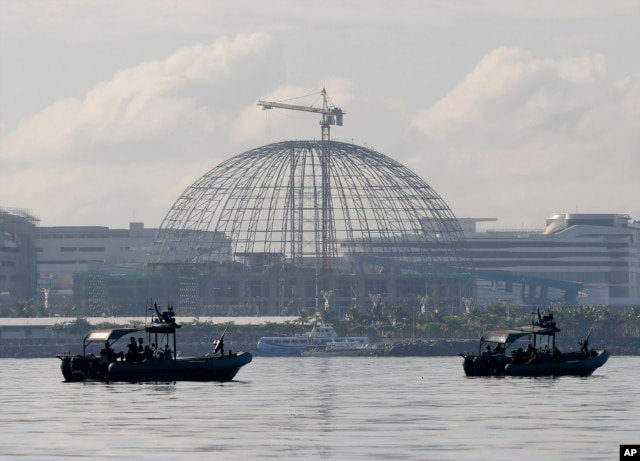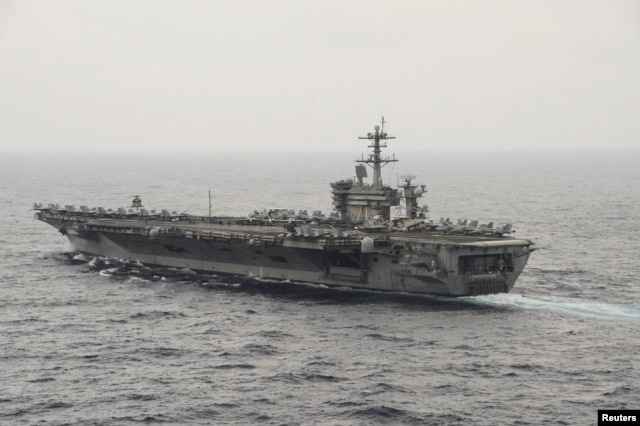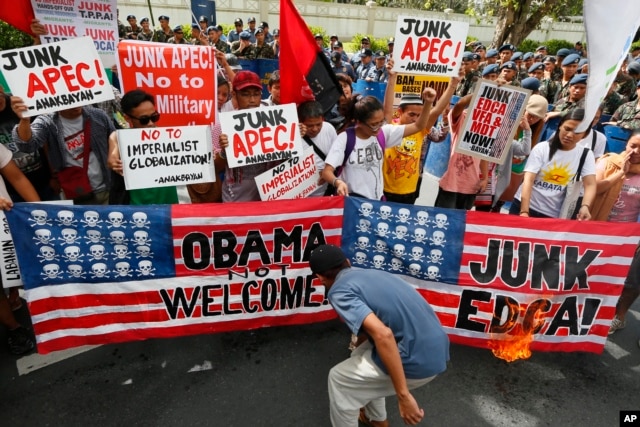APEC Summit to Focus on TPP, Not South China Sea
Nov 13, 2015
Even though tensions in the South China Sea may not be on the agenda of the upcoming Asia-Pacific Economic Cooperation (APEC) summit, the U.S.-China rivalry will still will be front and center when leaders from the 21 member states gather next week in Manila.
APEC members include major regional economies the U.S., China, Russia, Japan and South Korea, and together the group accounts for nearly half of all global trade and over 50 percent of world gross domestic product (GDP).
Both U.S. President Barack Obama and Chinese President Xi Jinping will be attending the influential Asia-Pacific economic forum being held this year in the Philippines capital.
The growing military tensions between Washington and Beijing over freedom of navigation and territorial disputes in the South China Sea would seem an appropriate issue to be addressed at the regional economic summit.
Beijing's claim to almost the entire South China Sea has produced jurisdictional disputes with Vietnam, the Philippines, Taiwan, Malaysia and Brunei. These countries have attempted to resolve their grievances with China at the Permanent Court of Arbitration in The Hague, but Beijing has refused to recognize or participate in this case.
This week Indonesia indicated it too may take China to the international court over its own case of conflicting claims to the Natuna islands.

The U.S., which has no conflicting claims of its own with China, recently sent a Navy warship near disputed South China Sea islets, claimed by Beijing, to protect the freedom of navigation in the region.
Beijing protested the incident as a provocation raising the potential for conflict near sea lanes where 40 percent of world trade passes.
“If that region is militarized or it becomes an area of conflict there would be great cost borne by everyone,” said Northeast Asia analyst Daniel Pinkston with the Conflict Studies Center at Babes-Bolyai University in Romania.
But this contentious issue may only be addressed on the APEC sidelines and deferred until most of the same leaders meet days later in Malaysia for the ASEAN security summit.

Trade issues
At the APEC forum that was founded in 1989 to promote free trade, the Trans Pacific Partnership (TPP) will likely be a major focus of discussion, which could also aggravate tensions between Beijing and Washington.
American economist Fred Bergsten with the Peterson Institute for International Economics said that in the 1990s, APEC first set forth the vision of creating a regional free trade zone to boost economic growth.
“The Trans Pacific Partnership is the first action [in] realization of those original APEC goals set over 20 years ago,” said Bergsten.
The TPP free trade pact is made up of 12 Pacific Rim economies that include Japan and the U.S., but not China.

Most other APEC members including South Korea, Indonesia and the Philippines have expressed interest in joining the TPP after the agreement is ratified and open to new members.
But China has not indicated it will seek to join the TPP. Peterson says with its slowing economic growth, Beijing seems unsure whether to join the U.S.-led free trade pact or try to revive stalled alternatives that include the Free Trade Area of the Asia-Pacific (FTAAP) and the Regional Comprehensive Economic Partnership (RCEP).
“One way or another China is feeling that it is being a bit disadvantaged by being left out and I think they are trying to figure out what their best strategy will be to recoup,” Bergsten said.
Beijing, Tokyo and Seoul recently agreed to pursue with each other free trade agreements and to press for the China-led RCEP, which excludes the U.S.
Countries looking to develop free trade pacts would likely now use the TPP as a guide, said Bergsten and an alternative Asia free trade agreement would likely be developed with an eye for eventual merging with the lucrative TPP market that makes up 40 percent of world trade.
In the U.S. and other developed TPP countries there are concerns that this free trade agreement will cost jobs and give an unfair trade advantage to low wage countries like Vietnam. But President Obama has argued the agreement raises standards for workers conditions and rights as well as for transparency and the rule of law. If the U.S. does not set these standards, he said, then it will abdicate that role to China.
Last year at APEC, China - with its $50 billion Asian Infrastructure Investment Bank - emerged as a major economic leader, but with the TPP the U.S. is now setting the agenda for trade.
Source: Voice of America